Poetry
Text and selection of content: Sergio García
«I was, I am and I will be a poet»
Poetry is possibly the least-known literary facet of Manuel Vázquez Montalbán, but this is no reason why it should not be considered the least important, as the writer always regarded himself as a poet, as he admitted in an interview he granted in 1997: “I was, I am and I will be a poet. I still don’t know, nor is it known, whether a good or a bad one, but I am a poet for the simple fact that I write poetry and that there is a close connection between my codes of expression.” On this page, we present an overview of the Montalbanian poetic works, highlighting his main publications and offering a brief sample of his poems.
We also provide a look at the group of the ‘novisimos’, to which Vázquez Montalbán belonged, who participated both in its literary approach and in the polemic it aroused. And finally, we suggest a selection of audiovisual works devoted to his poems and the musical reinterpretations thereof, together with another little-known facet of the author: song composition.
Poetic works
Manuel Vázquez Montalbán started his career as a poet in 1963, when still in prison in Lerida, when he completed his first collection of poetry, Una educación sentimental, which would be published in 1967. This book would be followed by six more, which would go on to form part of the cycle entitled Memoria y deseo, whose definitive edition dates back to 1996. Subsequently, the writer would publish two more collections of poetry, leaving a third unpublished, entitled Rosebud, which would be released in 2008 posthumously, as well as a series of poems dispersed in anthologies and journals.
Taking as its common theme the constant dialectic between “memory and desire”, which Vázquez Montalbán took from the opening of The Wasteland, by T.S. Eliot, Montalban’s poetry is singularly impervious to the poetic fashions of the twentieth century, and uses a very personal collage , where all the influences that made up his sentimental education come together, and constitutes the textual refuge of the most intimate reflection on his past and present, and some of the keys to his literary ideology, recognisable in the rest of his work: the losing side of the Civil War, the images of the month of April and the golden girl, the interpretation of the South Seas and the relationship between geometry and compassion, among others.
Selection of texts
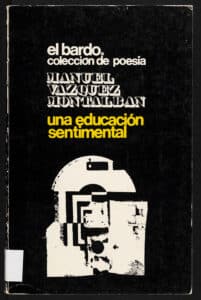
“nothing remained of the port,/twisted cranes, sunken patrol boats, baskets/loaded with capers and sunflowers, rubble/of mysteriously humanised bombs, were heard/fall later, already back to the city, like/an imposed night that is imposed screaming/suitors died and nobody descended to the street/to the passage of the draught horses/the geraniums/were exhausted in yellow ashes/then/they returned other afternoons in April, not those/dead/dead and forever/the gypsies lost spirit, they didn’t/sing, they coughed at night under the dampness, when/we sewed sad arrangements of old dresses/for the mutilated post-uncivil war bodies//immutable, beyond this window, this/blind, these empty pots like uninhabited planets, the grey sticks to hang out/washing, sandstone roofs and chipped bricks/black broken chimneys/ and yellow wild mustard flowers on eroding roofs.”
«II»
“Blind night birds, die/some vase with crepe roses,/you go up because of the cry and I descend/to the cemetery of your closed eyes,/diluted ivories, water lilies/drunkards of an ancient river, you go up/because of the scream and I descend dead/in a bubble of distilled wine,/open towers and a Roman amphora,/waves of oil against the cliff,/forbidden world, forbidden night,/you go up because of the scream and I descend/to the cemetery of your closed eyes//you open them, you hang the laughter from the air/and it remains like a lost Watteau/half Ektachrome souvenir/half sin.”
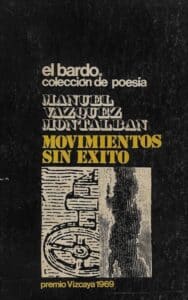
“but Gauguin/remained silent/he would have wanted/to paint those verses but they had no/colour or even a human emotion/the flight from the mandatory breakfast Bag/was not enough/the same words are always repeated/if the bodies do not change//in Tahiti/the authorities look with suspicion/at the white foreign lover of Kanaks/they did not understand that he was trying to objectify/the subjective/and that the animality/tenderness of the Kanaks was almost the end/of the vital journey of Paul Gauguin/banished in the Marquesas/he did time in prison as a suspect/of not instilling suspicion/in Paris/he was deemed an inveterate snob/only some natives knew his passing impotence/and that l’or de ses corps/was a pretext/to forget the black stalls of the fish markets/the cuckoo of a Copenhagen soup kitchen/a trip to Lima with a sad mother/the pedantic talks of Café Voltaire/and above all/the incomprehensible verses of Stéphane Mallarmé.”
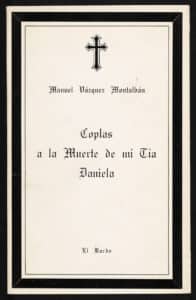
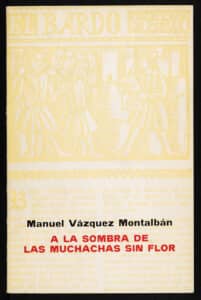
“I walk through a city/without shores/the afternoon lies/mirrors farewells smokes/that denounce returns/the passage of distant girls/leaves me alone /they do not pronounce my name nor do they decree/my death/then I return/to the coffered halls of memory/skins flesh replete silhouettes/stark naked/the noise of the eyelids when closing/and perhaps/perhaps a literary cry gave a name/to the moment when I was happy/in the shade/always at the shade/of girls without flowers.”
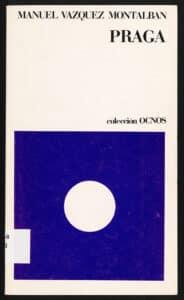
“Far from me so far away/the shelter of History/and of the earth/servants immigrant peasants/sailors castaways/in soft seas without islets/north of mists/witches condemned to their stake/south of flights//I did not choose to be born among you/in the city of your terrors/in its vanquished and fugitive south/mediocre trails of hunger and oblivion/I was a Chinese shadow on the walls/where they shot me rubber stamps and misgivings//I was born in the rearguard of the army that fled/I stayed in the light of the sentry/and I borrowed air and water/in neighbourhoods that you didn’t need/while you/vanquished madmen feigned seas/o’er which English princes would arrive/and take you to Prague to anchor you/in clean ports of the propitious north.”
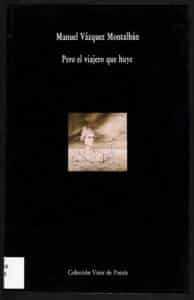
“The postman has brought the Bangkok Post/Thailand Travel/a sealed letter/the death of a loved one/for the girl of my American Breakfast/every morning/although I have asked for my letter/it wasn’t there/or I haven’t been given it compassionate/with the foreigner who waits life or death/ignored in a corner of Asia/the postman never rings twice/he travels on a Yamaha/and smiles in ignorance/that distance/allows memory to fulfil our desires.”
“Definitivamente nada quedó de abril…”
“Definitely nothing remained of April/poor April Rose the cruellest month/drawn death -death hypothesis -/ between my hands your cold face confirmed/the silence to which you take my memory/memory of my childhood and your post-war/your youth attacked by the dogs of History/my youth aggressor of your life instinct/Red rose/April the cruellest month engenders/desires on the dead land a mixture/of memory and desire while destroying Aprils/that were a promise of eternity// but the traveller/who flees sooner or later stops/when the hypothesis of the face of death/is manifested in the limits of the first/homeland.”
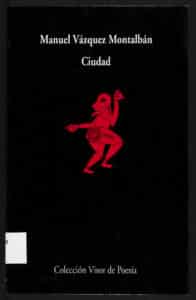
“goodbye golden girls in perpetual/sunset orange breasts/licked by the sunset point/to the windows where the peeping toms are in their death throes/goodbye corners prepared for deserters/from the death throes of pastry tigers/Sunday strollers/cities hemmed in by geometries/useless compassion where oblivion dwells// geometries of reason/walled/the cities are laid out in squares/paradises are circular/in the centre/of the world Heliopolis and Salem/city of sun and peace/pilgrim between two cities/that of Memory and that of Desire/that of Geometry and that of Compassion/matron cities crowned walls/the seven gates of heaven/the seven gates of Jerusalem/the seven gates of the body/the seven/cities of being for death/the mother/prophecy the flight the hells/the city of sand of dreams/the city of desire/could be called History of being true/add materials and build time//but you will only be free when you arrive at Memory/the city where your only destiny lives/the cold awaits beyond the homelands/beyond the known names/the gestures/without surprise or imagination are hidden/when you rest or are dead/of sincerity before the discovery/of going from fraud to fraud of death/in death//will architecture transform the death throes?/no labyrinth alters the result/but it is true that more pleasure is found/in long games that do not bore/in the perpetual/improvisation of not knowing what to do.”
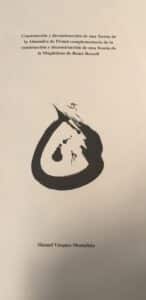
“let’s go back to the concrete/improvable/the concrete analysis of the concrete situation/comrades/the almond was between the sphere/and the crushed egg certain matter/fugitive of its edible metaphysics/not all that is eaten is metaphysical/dry green toast candied almond milk/for women with delicate/livers ovaries/commerce industry work landscape/life/memory like a Proust madeleine/morph into adjectives to substantive limits/almond tree almond almond grower flavour with almonds, almond grove/green almond almendrolón arzolla alloza soft-skinned/bittersweet tonsillar//wild almond tree: still green by land white inside/like the rose of Alexandria/or was it of Cairo?”
“Madre madre vestida madre”
“mother mother dressed mother/cornered tender dead/resurrected inadequate/we have walked then roads/on the days seas that are extinguished/in their own cold self-absorbed/and in our vapours of omen/we die accompanied by memories/the icy vapours stab/penultimate prophecies/summons of those who trust/in us to follow presences/diluted to the extent of oblivion/eyes closed/full of death dark grave/common that of the time where we buried/before dying in the hope/that someone will summon us/between the clumsy jobs and their days/and if they do it let it be in April/salty the sun salted olives/black black bread and the correlative/but it was your little mutilated hand/in battles of needles without thimbles/my homeland.”
To learn more about the poetry of Manuel Vázquez Montalbán:
- Manuel Rico, Memoria, deseo y compasión. Una aproximación a la poesía de Manuel Vázquez Montalbán, Barcelona, Mondadori, 2001.
- Marta Beatriz Ferrari, “Un novísimo atípico: la singularidad poética de Manuel Vázquez Montalbán”, Prosemas: Revista de Estudios Poéticos, 2016, 2, pp. 205-227.
- Sergio García García, Mezclando memoria y deseo. La poesía de Manuel Vázquez Montalbán (1963-2003), Valencia, Pre-Textos / Fundación Gerardo Diego, 2020.
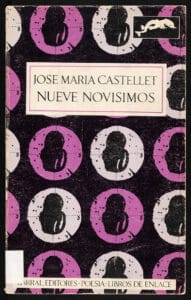
“In my first verses I called for freedom, bread, justice, free education and free love (in my teenage years I was a real paper tiger and very reformist).
Now I write as if I were an idiot, the only playful attitude that an intellectual can permit himself who is subjected to a precariously neo-capitalist organisation of culture.
Culture and lucidity lead to subnormality.
I take this opportunity to request a state grant as I am hyper-sensitive.
This year, Barça will win the [Spanish] League. Eugeni Trías will achieve a characteristic line-up: Sadurní; Torres, Gallego, Eladio; Rifé, Zabalza; Rexach, Marcial, Bustillo, Fusté and Pujol.
When things change I will change my aesthetic beliefs. For the moment they have cost me great pains to acquire. Perhaps it’s wrong to say so, but a servant owes nothing to no-oneand he can walk with his head held high.
Postscript: I’m not sure if I have made my point clearly. I believe that poetry, with the way culture is organised, is pointless. I suspect it serves no purpose anywhere. But the historical Spanish exceptionalism forces me to put off a universal judgement. I think writing is a gratuitous exercise that meets the needs of some 2,000 cultured progressives. Of those 2,000 cultured individuals, there are 700 or 800 who disagree with what one writes. Another 500 are more or less familiar with the writer and are not willing to take him seriously. The remaining 700 are critics, neighbours and old schoolmates. A special place must be set aside for Gimferrer, who reads almost everything, and Castellet, who reads everything to later compose anthologies. People do read anthologies. I think from now on I will only write anthologies. I was forgetting something. I believe in revolution. With one condition: freedom of expression. One other condition (if it’s not too much to ask): that in all competitive exams for the position of revolutionary bureaucrat there should be compulsory oral and written tasks on my work in prose and in verse. It wouldn’t be a bad idea either if excerpts of my works were used in the texts of Revolutionary Education as stylistic examples.
We have to help one another.” (Manuel Vázquez Montalbán, “Poética”, in J.M. Castellet, Nueve novísimos poetas españoles, Barcelona, Península, 2010, pp. 57-58).
“Yvonne de Carlo? Yvonne de Carlo…? Ah! Yvonne de Carlo!”, a poem specially written for the anthology Nueve novísimos poetas españoles.
“The bread was black or white/the oil muddy-green/persimmons the memories/Yvonne de Carlo/it was the technicolour/in her lilac outline stood out/the mouth heart, the bust heart/the panties heart in the dance/of Scheherazade//and in her smallness/remained the Arab promise/of the portable woman pleased/by the malnourished rhythm/of the tricycle-man//for us she was the girl/redeemable as a teacher/of first teaching/ her big /but dirty eyes we saw then/buttoning the gloom of the cafes/then they were/the closest thing to the diamonds of the treasure/private of the Masked Man/surprised/that Ana María the lover/of the Warrior of the Mask more seemed/Daughter of Maria than Yvonne de Carlo/with her prefabricated neckline and her photogenic/of clown/and when Mario Cabré, Mario Lepanto/Mario Tenorio, Mario Trento/Mario Gadner/would crack it at the Cannes Film Festival/(the more it flames and the more it burns/anyone who loves you/love, who follows you the most/burns in body and soul)/ambiguous/we feel nationally represented/more personally mocked/about to fall in love/girls with more flesh than bone/faded white panties/interviews/in furtive runs through parks/full of Sundays//tardy, someone told us/that girls die six days/every month/then they are resurrected/they accept furtive letters/and if you look like Peter Lawford/they let themselves be kissed.”
“Minutes after reading the prologue of the Nueve novismos to us, Castellet descended the stairs of his house with Félix de Azúa (another of those involved) we commented: the one who comes out best in the book is Castellet himself. “He’s relatively unfaithful to us”, commented Azúa con extremely deep comprehension. The public hasn’t seen it that way, with some exceptions, and Castellet has come out of it as “novisimo” [brand new] as the nine of use and I would go so far as to say more insulted, indeed. Because yours truly has been called a gossip and Gimferrer “Celia Gámez”, but they’ve called Castellet ignorant and unfaithful. These are serious charges. They are serious insults. Scientists would say, Scientists would say, not to be afraid to devalue a word that deserves so much respect.” (Manuel Vázquez Montalbán, “Castellet o la ética de la infidelidad”, Triunfo, 19 December 1970).
“Because something united us [i.e. Los Novísimos]. Having assimilated the relativisation of the poetic subject, already practised by Valente, Biedma, Barral, Ferrater, González, Crespo, Goytisolo and company; having understood the relativisation of the social-historical function of literature; valuing the exigency of the literary and rejecting the justification of ideological good intentions; starting from a higher level of cultural information in relation to post-war generations, partly thanks to the effort made by post-war generations. […] Not long ago in the pages of this newspaper a writer who, in other respects is an excellent writer, published the requiem 1,000 or 2,000 of Los novísimos and strove to demonstrate that almost all of we poets selected by Castellet were no longer poets, we were novelists, or critics, or teachers, or jury members of literary prizes. The illustrious article writer’s memory fails him, or his records, in almost all of the nine cases; as far as I am concerned, when Castellet put me in his national squad I had only published two books of poems and so far I have published five, the last and excellent one in 1982, entitled Praga. Five books are a lot of books, too many I would say, and I believe I deserve the label of poet, one who has not discredited Castellet’s assessment, that is to say, as one of the 10,000 best Spanish poets at the end of the sixties” (Manuel Vázquez Montalbán, «Sobre los “novísimos” y sus postrimerías», El País, 3 December 1985).
To learn more about Nueve novísimos poetas españoles and the Generation of 68:
- Guillermo Carnero (coord.), “De estética novísima y “novísimos”, Ínsula: Revista de Letras y Ciencias Humanas, 1989, 505 and 508.
- Ángel Luis Prieto de Paula, Musa del 68. Claves de una generación poética, Madrid, Hiperión, 1996.
- Juan José Lanz, Nuevos y novísimos poetas. En la estela del 68, Seville, Renacimiento, 2011.
- Araceli Iravedra (ed.), Hacia la democracia. La nueva poesía (1968-2000), Madrid, Visor / Centro para la Edición de los Clásicos Españoles, 2016.
- Sergio Fernández Martínez (ed.), Novísima antología novísima, Leon, EOLAS Ediciones, 2021.

“nothing remained of the port,/twisted cranes, sunken patrol boats, baskets/loaded with capers and sunflowers, rubble/of mysteriously humanised bombs, were heard/fall later, already back to the city, like/an imposed night that is imposed screaming/suitors died and nobody descended to the street/to the passage of the draught horses/the geraniums/were exhausted in yellow ashes/then/they returned other afternoons in April, not those/dead/dead and forever/the gypsies lost spirit, they didn’t/sing, they coughed at night under the dampness, when/we sewed sad arrangements of old dresses/for the mutilated post-uncivil war bodies//immutable, beyond this window, this/blind, these empty pots like uninhabited planets, the grey sticks to hang out/washing, sandstone roofs and chipped bricks/black broken chimneys/ and yellow wild mustard flowers on eroding roofs.”
«II»
“Blind night birds, die/some vase with crepe roses,/you go up because of the cry and I descend/to the cemetery of your closed eyes,/diluted ivories, water lilies/drunkards of an ancient river, you go up/because of the scream and I descend dead/in a bubble of distilled wine,/open towers and a Roman amphora,/waves of oil against the cliff,/forbidden world, forbidden night,/you go up because of the scream and I descend/to the cemetery of your closed eyes//you open them, you hang the laughter from the air/and it remains like a lost Watteau/half Ektachrome souvenir/half sin.”

“but Gauguin/remained silent/he would have wanted/to paint those verses but they had no/colour or even a human emotion/the flight from the mandatory breakfast Bag/was not enough/the same words are always repeated/if the bodies do not change//in Tahiti/the authorities look with suspicion/at the white foreign lover of Kanaks/they did not understand that he was trying to objectify/the subjective/and that the animality/tenderness of the Kanaks was almost the end/of the vital journey of Paul Gauguin/banished in the Marquesas/he did time in prison as a suspect/of not instilling suspicion/in Paris/he was deemed an inveterate snob/only some natives knew his passing impotence/and that l’or de ses corps/was a pretext/to forget the black stalls of the fish markets/the cuckoo of a Copenhagen soup kitchen/a trip to Lima with a sad mother/the pedantic talks of Café Voltaire/and above all/the incomprehensible verses of Stéphane Mallarmé.”


“I walk through a city/without shores/the afternoon lies/mirrors farewells smokes/that denounce returns/the passage of distant girls/leaves me alone /they do not pronounce my name nor do they decree/my death/then I return/to the coffered halls of memory/skins flesh replete silhouettes/stark naked/the noise of the eyelids when closing/and perhaps/perhaps a literary cry gave a name/to the moment when I was happy/in the shade/always at the shade/of girls without flowers.”

“Far from me so far away/the shelter of History/and of the earth/servants immigrant peasants/sailors castaways/in soft seas without islets/north of mists/witches condemned to their stake/south of flights//I did not choose to be born among you/in the city of your terrors/in its vanquished and fugitive south/mediocre trails of hunger and oblivion/I was a Chinese shadow on the walls/where they shot me rubber stamps and misgivings//I was born in the rearguard of the army that fled/I stayed in the light of the sentry/and I borrowed air and water/in neighbourhoods that you didn’t need/while you/vanquished madmen feigned seas/o’er which English princes would arrive/and take you to Prague to anchor you/in clean ports of the propitious north.”

“The postman has brought the Bangkok Post/Thailand Travel/a sealed letter/the death of a loved one/for the girl of my American Breakfast/every morning/although I have asked for my letter/it wasn’t there/or I haven’t been given it compassionate/with the foreigner who waits life or death/ignored in a corner of Asia/the postman never rings twice/he travels on a Yamaha/and smiles in ignorance/that distance/allows memory to fulfil our desires.”
“Definitivamente nada quedó de abril…”
“Definitely nothing remained of April/poor April Rose the cruellest month/drawn death -death hypothesis -/ between my hands your cold face confirmed/the silence to which you take my memory/memory of my childhood and your post-war/your youth attacked by the dogs of History/my youth aggressor of your life instinct/Red rose/April the cruellest month engenders/desires on the dead land a mixture/of memory and desire while destroying Aprils/that were a promise of eternity// but the traveller/who flees sooner or later stops/when the hypothesis of the face of death/is manifested in the limits of the first/homeland.”

“goodbye golden girls in perpetual/sunset orange breasts/licked by the sunset point/to the windows where the peeping toms are in their death throes/goodbye corners prepared for deserters/from the death throes of pastry tigers/Sunday strollers/cities hemmed in by geometries/useless compassion where oblivion dwells// geometries of reason/walled/the cities are laid out in squares/paradises are circular/in the centre/of the world Heliopolis and Salem/city of sun and peace/pilgrim between two cities/that of Memory and that of Desire/that of Geometry and that of Compassion/matron cities crowned walls/the seven gates of heaven/the seven gates of Jerusalem/the seven gates of the body/the seven/cities of being for death/the mother/prophecy the flight the hells/the city of sand of dreams/the city of desire/could be called History of being true/add materials and build time//but you will only be free when you arrive at Memory/the city where your only destiny lives/the cold awaits beyond the homelands/beyond the known names/the gestures/without surprise or imagination are hidden/when you rest or are dead/of sincerity before the discovery/of going from fraud to fraud of death/in death//will architecture transform the death throes?/no labyrinth alters the result/but it is true that more pleasure is found/in long games that do not bore/in the perpetual/improvisation of not knowing what to do.”

“let’s go back to the concrete/improvable/the concrete analysis of the concrete situation/comrades/the almond was between the sphere/and the crushed egg certain matter/fugitive of its edible metaphysics/not all that is eaten is metaphysical/dry green toast candied almond milk/for women with delicate/livers ovaries/commerce industry work landscape/life/memory like a Proust madeleine/morph into adjectives to substantive limits/almond tree almond almond grower flavour with almonds, almond grove/green almond almendrolón arzolla alloza soft-skinned/bittersweet tonsillar//wild almond tree: still green by land white inside/like the rose of Alexandria/or was it of Cairo?”
“Madre madre vestida madre”
“mother mother dressed mother/cornered tender dead/resurrected inadequate/we have walked then roads/on the days seas that are extinguished/in their own cold self-absorbed/and in our vapours of omen/we die accompanied by memories/the icy vapours stab/penultimate prophecies/summons of those who trust/in us to follow presences/diluted to the extent of oblivion/eyes closed/full of death dark grave/common that of the time where we buried/before dying in the hope/that someone will summon us/between the clumsy jobs and their days/and if they do it let it be in April/salty the sun salted olives/black black bread and the correlative/but it was your little mutilated hand/in battles of needles without thimbles/my homeland.”
To learn more about the poetry of Manuel Vázquez Montalbán:
- Manuel Rico, Memoria, deseo y compasión. Una aproximación a la poesía de Manuel Vázquez Montalbán, Barcelona, Mondadori, 2001.
- Marta Beatriz Ferrari, “Un novísimo atípico: la singularidad poética de Manuel Vázquez Montalbán”, Prosemas: Revista de Estudios Poéticos, 2016, 2, pp. 205-227.
- Sergio García García, Mezclando memoria y deseo. La poesía de Manuel Vázquez Montalbán (1963-2003), Valencia, Pre-Textos / Fundación Gerardo Diego, 2020.

“In my first verses I called for freedom, bread, justice, free education and free love (in my teenage years I was a real paper tiger and very reformist).
Now I write as if I were an idiot, the only playful attitude that an intellectual can permit himself who is subjected to a precariously neo-capitalist organisation of culture.
Culture and lucidity lead to subnormality.
I take this opportunity to request a state grant as I am hyper-sensitive.
This year, Barça will win the [Spanish] League. Eugeni Trías will achieve a characteristic line-up: Sadurní; Torres, Gallego, Eladio; Rifé, Zabalza; Rexach, Marcial, Bustillo, Fusté and Pujol.
When things change I will change my aesthetic beliefs. For the moment they have cost me great pains to acquire. Perhaps it’s wrong to say so, but a servant owes nothing to no-oneand he can walk with his head held high.
Postscript: I’m not sure if I have made my point clearly. I believe that poetry, with the way culture is organised, is pointless. I suspect it serves no purpose anywhere. But the historical Spanish exceptionalism forces me to put off a universal judgement. I think writing is a gratuitous exercise that meets the needs of some 2,000 cultured progressives. Of those 2,000 cultured individuals, there are 700 or 800 who disagree with what one writes. Another 500 are more or less familiar with the writer and are not willing to take him seriously. The remaining 700 are critics, neighbours and old schoolmates. A special place must be set aside for Gimferrer, who reads almost everything, and Castellet, who reads everything to later compose anthologies. People do read anthologies. I think from now on I will only write anthologies. I was forgetting something. I believe in revolution. With one condition: freedom of expression. One other condition (if it’s not too much to ask): that in all competitive exams for the position of revolutionary bureaucrat there should be compulsory oral and written tasks on my work in prose and in verse. It wouldn’t be a bad idea either if excerpts of my works were used in the texts of Revolutionary Education as stylistic examples.
We have to help one another.” (Manuel Vázquez Montalbán, “Poética”, in J.M. Castellet, Nueve novísimos poetas españoles, Barcelona, Península, 2010, pp. 57-58).
“Yvonne de Carlo? Yvonne de Carlo…? Ah! Yvonne de Carlo!”, a poem specially written for the anthology Nueve novísimos poetas españoles.
“The bread was black or white/the oil muddy-green/persimmons the memories/Yvonne de Carlo/it was the technicolour/in her lilac outline stood out/the mouth heart, the bust heart/the panties heart in the dance/of Scheherazade//and in her smallness/remained the Arab promise/of the portable woman pleased/by the malnourished rhythm/of the tricycle-man//for us she was the girl/redeemable as a teacher/of first teaching/ her big /but dirty eyes we saw then/buttoning the gloom of the cafes/then they were/the closest thing to the diamonds of the treasure/private of the Masked Man/surprised/that Ana María the lover/of the Warrior of the Mask more seemed/Daughter of Maria than Yvonne de Carlo/with her prefabricated neckline and her photogenic/of clown/and when Mario Cabré, Mario Lepanto/Mario Tenorio, Mario Trento/Mario Gadner/would crack it at the Cannes Film Festival/(the more it flames and the more it burns/anyone who loves you/love, who follows you the most/burns in body and soul)/ambiguous/we feel nationally represented/more personally mocked/about to fall in love/girls with more flesh than bone/faded white panties/interviews/in furtive runs through parks/full of Sundays//tardy, someone told us/that girls die six days/every month/then they are resurrected/they accept furtive letters/and if you look like Peter Lawford/they let themselves be kissed.”
“Minutes after reading the prologue of the Nueve novismos to us, Castellet descended the stairs of his house with Félix de Azúa (another of those involved) we commented: the one who comes out best in the book is Castellet himself. “He’s relatively unfaithful to us”, commented Azúa con extremely deep comprehension. The public hasn’t seen it that way, with some exceptions, and Castellet has come out of it as “novisimo” [brand new] as the nine of use and I would go so far as to say more insulted, indeed. Because yours truly has been called a gossip and Gimferrer “Celia Gámez”, but they’ve called Castellet ignorant and unfaithful. These are serious charges. They are serious insults. Scientists would say, Scientists would say, not to be afraid to devalue a word that deserves so much respect.” (Manuel Vázquez Montalbán, “Castellet o la ética de la infidelidad”, Triunfo, 19 December 1970).
“Because something united us [i.e. Los Novísimos]. Having assimilated the relativisation of the poetic subject, already practised by Valente, Biedma, Barral, Ferrater, González, Crespo, Goytisolo and company; having understood the relativisation of the social-historical function of literature; valuing the exigency of the literary and rejecting the justification of ideological good intentions; starting from a higher level of cultural information in relation to post-war generations, partly thanks to the effort made by post-war generations. […] Not long ago in the pages of this newspaper a writer who, in other respects is an excellent writer, published the requiem 1,000 or 2,000 of Los novísimos and strove to demonstrate that almost all of we poets selected by Castellet were no longer poets, we were novelists, or critics, or teachers, or jury members of literary prizes. The illustrious article writer’s memory fails him, or his records, in almost all of the nine cases; as far as I am concerned, when Castellet put me in his national squad I had only published two books of poems and so far I have published five, the last and excellent one in 1982, entitled Praga. Five books are a lot of books, too many I would say, and I believe I deserve the label of poet, one who has not discredited Castellet’s assessment, that is to say, as one of the 10,000 best Spanish poets at the end of the sixties” (Manuel Vázquez Montalbán, «Sobre los “novísimos” y sus postrimerías», El País, 3 December 1985).
To learn more about Nueve novísimos poetas españoles and the Generation of 68:
- Guillermo Carnero (coord.), “De estética novísima y “novísimos”, Ínsula: Revista de Letras y Ciencias Humanas, 1989, 505 and 508.
- Ángel Luis Prieto de Paula, Musa del 68. Claves de una generación poética, Madrid, Hiperión, 1996.
- Juan José Lanz, Nuevos y novísimos poetas. En la estela del 68, Seville, Renacimiento, 2011.
- Araceli Iravedra (ed.), Hacia la democracia. La nueva poesía (1968-2000), Madrid, Visor / Centro para la Edición de los Clásicos Españoles, 2016.
- Sergio Fernández Martínez (ed.), Novísima antología novísima, Leon, EOLAS Ediciones, 2021.
Contributions
Manuel Vázquez Montalbán never stopped writing poems at any point in his life, and not a few of them were set to music by various artists, both Spanish and foreign. In addition, some recordings survive of the author himself reciting his poetic texts. And very much in line with his poetic side and his interest in various musical forms, it should be noted that the Barcelona writer also authored song lyrics, such as the tangos included in his novel Quinteto de Buenos Aires (1997), and musicals, such as Guillermotta en el país de las Guillerminas (1973) and Flor de nit (1992).
In addition, theatrical works have been created based on some of his texts, such as Se vive solamente una vez (1981), an adaptation of his work Cuestiones marxistas (1974), and Groucho me enseñó su camiseta (2009).
Audiovisuals
Manuel Vazquez Montalbán. El poeta en su voz. Rtve play. Episode on Manuel Vázquez Montalbán, filmed in Barcelona and broadcast in 1989.
ACEC. Manuel Vázquez Montalbán reciting poems and talking about his poetry. Filmed in Vallvidrera in 22 April 2003:
Segú, Jordi. «Caleidoscopio Montalbán». Imprescindibles. Rtve. La 2
Guillermina Motta. Aquellos tiempos del cuplé. Theme with lyrics by Manuel Vázquez Montalbán, min 00:00-00:39
Selection of musical versions and performances of poems and songs by Manuel Vázquez Montalbán:
Songs from Guillermotta en el país de las Guillerminas performed by Guillermina Motta in the RTVE programme La hora de Guillermina Motta, broadcast in 1976.
Flor de nit, a work of musical theatre written by Vázquez Montalbán based on an idea by Dagom Dagoll and premiered in Barcelona in April 1992 directed by Juan Antonio Ríos. The full text can be consulted in the Biblioteca Virtual Miguel de Cervante
Groucho me enseñó su camiseta, a musical show based on the songs written by Vázquez Montalbán, premièred in Madrid in September 2009 directed by Manuel Gas and Damià Barbany.
“Poema al Che Guevara”, published in the Cuban anthology Poemas al Che. 84 poetas de España y América rinden homenaje al guerrillero 1969, sung by Juan Carlos “Flaco” Biondini
Poem «Inútil escrutar tan alto cielo”, from Pero el viajero que huye, sung by Loquillo.
Tango “¡Hombre oculto!”, included in Quinteto de Buenos Aires and sung by Jaime Ross.
Poem «Oh ciudad del terror», from Praga, set to music as O Vals das Mouras.
Poem «Oh ciudad del terror», from Praga, set to music as O Vals das Mouras.
«Aproximaciones a Manuel Vázquez Montalbán», a talk given by Pere Gimferrer in the Biblioteca Nacional de España on 4 December 2013.
XVII Jornadas Poètiques de l’ACEC dedicated to Manuel Vázquez Montalbán, held between 29 and 30 October 2018.
Appearances by Manuel Rico, Quim Aranda, Guillermo Carnero, Juan Antonio Masoliver Ródenas, Eduardo Mendoza, Carlos Zanón and Josep Maria Pou.
Audiovisual resources about Manuel Vázquez Montalbán on the website of the Asociación de Estudios Manuel Vázquez Montalbán.